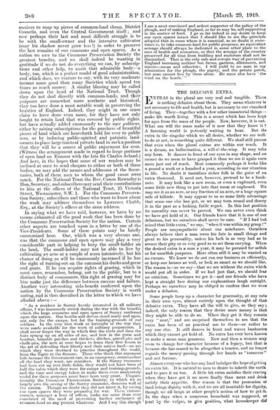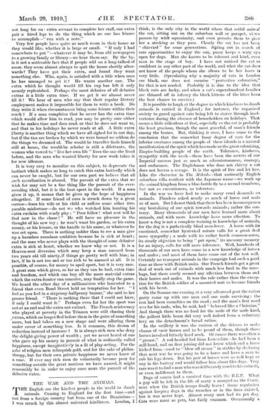THE DELUSIVE EXTRA.
EXTRAS in the plural are very real and tangible. There is nothing delusive about them. They mean whatever is not necessary to life and health, but is necessary to our standard of living. They—together with a few other immaterial things— make life worth living. This is a secret which has been kept for ages from the mass of the people. Now, however, it is out. What use will the mass make of it now that they know it ? A listening world is patiently waiting to hear. But the extra in the singular which we all desire, whether we are well- to-do or not, is something quite different. We shall still pursue that even when the plural extras are within our reach. It is a dream, an hallucination, a will-&-the-wisp. It may take any form. It dances in front of our eyes in any shape, and no sooner do we seem to have grasped it than we see it again once more just out of reach. Most commonly perhaps it looks like a pound a week or a hundred a year, according to our situation in life. No doubt it tantalizes richer folk in the guise of an extra thousand. It need not, however, pretend to be a bank- note. It may look like a new room, or even a cupboard, even some little new thing to put into that room or cupboard. Wo may see it as an acre, or any fraction of an acre, or a huge square mile of hillside. It may appear to us as some little advantage that sonic one else has got, or we may turn round and descry it in the past as a lurking, futile regret. In this last position its unreality can never be proved. We can never even think we have got hold of it. Our friends know that it is one of our delusions, but we ourselves shall never be sun!. "If I bad but seized that little extra," we say, " when it was within my grasp !" People are unsympathetic about our mischance. Outsiders always believe that a man owes his fate in small things and great to his personality, unless his luck is so very bad as to arouse their pity or so very good as to set them envying. When the desired extra is a sum a year, it may be pursued for selfish or for unselfish purposes. More often still it may be wanted as an excuse. We know we do not run our business as efficiently, or keep our houses as well, or look as smart as we should like. The reason is—so we say—that we are without the extra which would put all in order. If we had just that, we should fear no criticism. Sometimes we get it—and our friends who have kept a straight face during our explanations laugh outright, Perhaps we ourselves may be obliged to confess that we were under a delusion.
Some people keep up a character for generosity, at any rate in their own eyes, almost entirely upon tho thought of that delusive extra. They have all the will to give, so they say ; indeed, the only reason that they desire more money is that they might be able to do so. When they get it they remain very " near," and are surprised themselves to see that the extra has been of no practical use to them—or rather to any one else. It still dances in front and waves banknotes which they cannot get hold of. No extra has ever been known to make a mean man generous. Now and then a woman may seem to change her character because of a legacy, but that is because she has ceased to be altogether a trustee, and no longer regards the money passing through her hands as "turnover" and not fortune.
Almost everyone who has any land indulges the hope of gettinj an extra bit. It is natural to men to desire to inherit the earth and to pass it on too. A little bit extra satisfies their craving when they have got it no more finally than meat and chilli satisfy their appetite. One reason is that the possession of land brings dignity with it, and we are all insatiable for dignity, though we all laugh at other people's notion of how to get it. In the days when a numerous household was supposed, at least by the vulgar, to give position, what housekeeper did not long for on' extra servant to complete her staff, one extra pair o hired legs to do the thing which no one has leisure to accomplish—" run with a note."
• Very few people have quite as much room in their house as they would like, whether it is large or small. " If only I had somewhere to put "—whatever it may be, from old newspapers to a growing family or library—we hear them say. By the by, is it not a noticeable fact that if people add on a long-talked-of room, they seem almost always to quit the house shortly after- wards? They have got their extra, and found they want something else. Who, again, is satisfied with a title when once he has managed to get it ? He wants another one. The extra which he thought would fill his cup has left it only meanly replenished. Perhaps the most delusive of all delusive extras is a little extra time. If we get it we almost never fill it ! We hear of men who say that their regular literary employment makes it impossible for them to write a book. Do they write it when circumstances bring some leisure within their reach ? If a man complains that he never has the extra time which would allow him to read, you may be pretty sure either that he makes time and does read, or that he does not want to, and that in his holidays he never reads at all. A little extra liberty is another thing which we have all sighed for in our day, but if the ties are broken by which we were bound we seldom do the things we dreamed of. The would-be traveller finds himself still at home, the would-be scholar is still a dilettante, the woman who vowed to " live her own life " lives the one she lived before, and the man who wanted liberty for new work takes it for new idleness.
It is 'very easy to moralize on this subject, to deprecate the instinct which makes us long to catch this extra butterfly which can never be caught, but for our own part we believe that all such moralization is absurd. The pursuit of the extra that we wish for may not be a fine thing like the pursuit of the ever- receding ideal, but it is the best sport in the world. If a man gives it up, it means that he gives up the hope of happiness altogether. If some friend of ours is struck down by a great sorrow—loses his wife or his child or suffers some other irre. parable misfortune—do not we whs watched him hunting his extra exclaim with ready pity : "Poor fellow! what zest will he find now in the chase !" He will have no pleasure in the thought of his new toy ; he won't want his garden, or his extra money, or his leisure, or the handle to his name, or whatever he was set upon. There is nothing sadder than to see a man give up a harmless mundane ambition because he is sick at heart; and the man who never plays with the thought of some delusive extra is sick at heart, whether we know why or not. It is a Heaven-sent diversion which may keep a man amused from two years old till ninety,if things go pretty well with him; in fact, if he is not too sad or too rich to be amused at all. It is possible, of course, for money to spoil sport, but it is very rare. A great sum which gives, no far as they can be had, extra time and freedom, and which can buy all the more material extras which the extra-hunter can conceive, may finally stop the game. We heard the other day of a millionairess who lamented to a friend that even Bond Street held no temptation for her. " I feel as you feel in a sixpenny-halfpenny bazaar," she said to her poorer friend. "There is nothing there that I could not have, if only I could want it." Perhaps even for her the sport was not at an end and the extra not extinct. The French aristocracy who played at poverty in the Trianon were still chasing their extras, which no longer fled before them in the guise of something more, but had taken on a new shape and were alluring them under cover of something less. Is it common, this dream of reduction instead of increase ? It is always rich men who deny the delight-giving power of wealth ; yet we never heard of one who gave up his money in pursuit of what is ordinarily called happiness, except imaginatively in a fit of play-acting. For the sake of religion men relinquish gold, and for the sake of philan- thropy, but for their own private happiness we never knew of a case. If ever any rich men do voluntarily become poor for something outside the great motives we have named, it might reasonably be in order to enjoy once more the pursuit of the delusive extra.



































 Previous page
Previous page